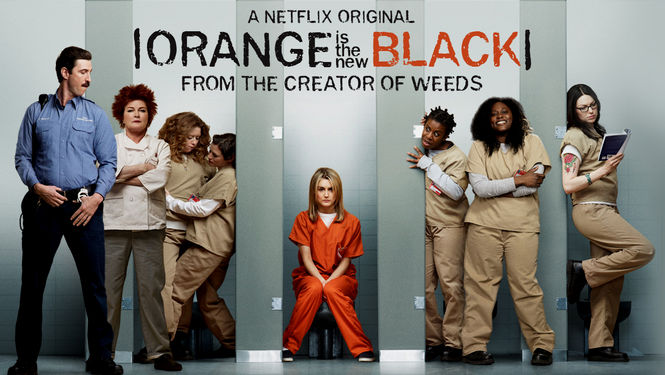So I had a post on Orange Is the New Black become a viral hate read over at the Atlantic this week. In celebration (?) and as a low key way to post without posting on the fourth, I thought I’d provide an index of my writing on the show for those who are curious. The articles are arranged chronologically in the order they were published.
___________
At Public Books, Orange Is the New Caged, on how the first season picks up on tropes of femininity and lesbianism from the 1950 women-in-prison film Caged. (This is part of a roundtable at Public Books; lots of other good essays on the series by other folks there too if you want to browse around.)
At Splice Today, The Crassness of Orange Is the New Black, on how the first season adds sex and deviance to the memoir.
At the Atlantic, “A Lewd Reminder of How Tame Oranges Is the New Black Really Is”, in which I compare the first season to the 1974 film Caged Heat, and talk about political and sexual fantasies.
Right here at HU, Orange Is the New Black: Episode 7 Hate Blogging, in which I blog my way through a second season episode.
At Splice Today, Prison and White People, in which I talk about why focusing on Piper’s white privilege misses out on the way that institutional racism is not her friend.
And finally, the hate read at the Atlantic, Orange Is the New Black’s Irresponsible Portrayal of Men, in which I argue that the show’s relationship to male prisoners is problematic.
There were a number of online responses to the piece, most of them not really all that useful from my perspective. A couple of the more interesting ones were by Alyssa Rosenberg and Madeleine Davies. This piece by Sonny Bunch is probably the best though; mean-spirited and clever.
__________
What the hell; might as well respond briefly. Alyssa’s piece argues that it would be more strategic for me to criticize some show other than Orange Is the New Black. Her reasons are somewhat unclear; as far as I can tell, the argument is partially that OITNB is relatively good, and partially that it has a relatively small audience, so I’d be better criticizing NCIS, or whatever. To the first point, I’d say that whether the show is good or not is part of the question at issue; just because Alyssa thinks it is isn’t a reason for me to toss over my own opinion and write about something else. For the second…you don’t influence people based on what show you talk about, in any direct way. You influence people based on the reaction to what you, yourself, are writing. And as far as being strategic and getting my message out…this was one of the most popular things I’ve ever written (for better or worse.)
Alyssa concludes by saying, “If we want a culture that tells a wider variety of stories, we need to work on moving culture at the mainstream, rather than simply at the margins,” but that seems to assume that my criticism is going to move NCIS or OITNB in some direct way. I really doubt that that’s the way these things work, particularly. You move people through criticism the way you move people with any art; sporadically, confusedly, maybe if you’re lucky but generally not, depending on a lot of factors. The idea that you move the mainstream by talking about a mainstream show and move the margins by talking about a marginal show strikes me as really simplistic (not least because, for example, Alyssa probably wouldn’t even have written her post if I had been writing about something other than OITNB.)
Caroline Small on facebook also pointed out that culture often moves not by moving the mainstream, but by changing the margins, which then shifts the center. Which I think certainly can be the case, at least.
Sonny Bunch in his response to my piece sneers at the whole idea of thinking about representation in art, arguing that doing so isn’t criticism. He says that:
There’s also the obvious point to be made that this isn’t “criticism” in the traditional sense: there’s little discussion of craft or storytelling, no sense of how the authors of the program help us understand the world they’ve created. It’s a simple collection of grievances that can be summarized thusly: “Why aren’t you telling the story I think needs to be told and why have you portrayed a group I believe needs defending in an unflattering light?
What’s really funny about this is that it’s gloriously self-refuting, and utterly unaware of it. After all, Bunch isn’t looking at the craft of my essay; he’s not trying to figure out how my essay forms a coherent intellectual world. He’s just listing grievances, and asking, “why aren’t you writing the kind of criticism I want you to write?”
I’d argue (contra the somewhat confused Bunch) that Bunch’s criticism is entirely defensible as criticism, because engaging with the ideology and the preconceptions of the work you’re looking at is a legitimate critical project. The problem with Bunch’s view isn’t that he engages with my ideology and my preconceptions; the problem is that he’s not a very attentive reader, and so isn’t alert to the fact that I have quite a bit to say about craft, about storytelling, and about how the program creators help us understand the world they’ve created (hint; they do it in part through gender stereotypes.)

